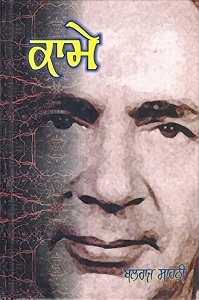Feb 07, 2026
Feb 07, 2026
 This is a translation of the Punjabi story ‘Athru’ which is one of the thirteen stories in the book ‘Kaame’ written by Balraj Sahni
This is a translation of the Punjabi story ‘Athru’ which is one of the thirteen stories in the book ‘Kaame’ written by Balraj Sahni
Continued from Previous Page
My thoughts changed again as I was turning the keys of the gigantic almirah. Why should I give him ten or twenty rupees? I will hand over two rupees and ask him to leave. It is the Government’s job to eradicate the poverty and hunger of the nation. Neither an individual nor any organization or a society can be of much help. Charity does not solve any problems. If I have to fulfill my desire of becoming a littérateur by saving some money and freeing myself from this slave-like lifestyle, then I will have to accept selfishness. Last month itself I had spent two hundred rupees in the treatment of a Hyderabadi Muslim boy and then sending him back home. If I will have nothing left for myself, then to whom will I turn for money? I am a famous actor today. I will have to set some rules for myself. I will have to respect both time and money. Success in films is like a monsoon shower, which can never be trusted.
I took out four rupees and then went outside. I realised that the more successful a man is, the more miserly he becomes. We used to read about many famous personalities that they led disciplined lives. They never used to waste a single moment. We were taught in schools that they became successful because of such qualities. These qualities of great men influence other people.
But, in fact, is this type of self-control not a symbol of hard-heartedness and selfishness? In the society which is divided into higher and lower classes, the lower class people always look towards the upper class people to solve their problems, while the latter, in order to save themselves from such attacks, create a high wall of self-control around themselves, so that the needy people do not empty their treasures. It is the quality of the upper class people to be self-disciplined, not of the lower ones.
I went outside. I handed over the money to the boy and said:
“Take these four rupees, please. Do not expect me to help you in finding a job.”
The boy said:
“I am really ashamed, Bhapa ji*. To tell you the truth, I came to your house twice earlier. But I did not have the courage to go inside. I thought, God knows what you would think…”
That same sweet rustic tone! Carefree! A villager speaks in the same tone, as if he has preserved the letters of the Punjabi language very neatly and lovingly in his heart. He speaks very softly and utters every word cautiously and very sweetly, and the listener is able to get a glance into the personality of the speaker shining like a mirror, from behind the soft spoken language.
“Do you belong to a village?”
“Yes, Bhapa ji! Our home was near the Old Fort. My father used to handle automobiles. These days he lives in Dehradun. My Uncle (chachaji), Yogi Nath, who lived in another village, used to be a well-known worker of the Congress.
“Yogi Nath?”
I was shocked. Is this poorly clad, poverty-stricken boy, the nephew of my dearest friend, Yogi Nath?
I felt as if my wall of self-control had been shattered by a single punch of this boy. I kept my hand on his shoulder and brought him inside, asking him to sit on the cane pouf (moodha).
“So, where is Yogi Nath these days?”
“In Delhi, Bhapa ji.
“He had a great influence in Congress. Couldn’t he do something for you?”
“You know about his health condition, Bhapa ji,” the boy said laughingly. “He has a small two-storey house in Mehrauli. He lives on the first floor and runs a Clinic on the ground floor. He does not take any fees from anybody. He has kept a very small casket. If someone wishes, he may put some money in that casket. Once woman came to him with a request saying that a government officer had taken bribe and given the house allotted to her to someone else. Yogi ji went himself and enquired. The woman was telling the truth. He directly went to Nehru ji’s bungalow and Pandit ji instructed other people that justice should be done with the woman.
Nehru ji enquired. That officer sought apology. But he had already done the allotment. He was transferred from Delhi and sent elsewhere and then the fresh allotment were done again, and the woman got her house. But Yogi ji did not even remember to file an application for allotment for his own wife.”
“How did you happen to come to Bombay?”
I had not told him even till now that Yogi was my dear friend. Nehru’s bungalow is huge. I did not have the courage to keep this boy at my own home. I wanted to keep the boundary walls of my heart intact. As much as I can help him easily, I shall help. I will not become emotional….
Probably Nehru had personally not only helped this woman. He must have helped thousands more. Nehru is really a man with high ideals. He is a man who feels the pain and sufferings of the humankind…. but still he has locked himself in a strong castle, because he must be knowing that he alone cannot find a solution to the problems of poverty and hunger and the injustices meted out to the forty-crore people. The system needs to be changed. The need of the hour is to erase the differences between the rich and the poor….
Continued to Next Page
29-Jul-2023
More by : Dr. Giti Tyagi